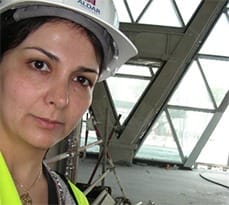Nada Chahadi (EMBA 2016) is an architect from the Middle East, specialising in mega-scale building projects across the region.
Nada Chahadi (EMBA 2016) is an experienced architect from Lebanon, specialising in large-scale building projects that contribute to the Middle East’s modern identity. Whether it be office towers, residential developments or even military structures, Nada recognises architecture as a subject that represents more than just bricks, mortar and steel.
“Since childhood, I have always been fascinated by science and mesmerised by art. Architecture combines both science and art together. A building can be read like a journal, in that it can reflect the passions, beliefs and lifestyles of entire civilisations.”
The challenge of speed vs quality
Now working for Khatib & Alami (K&A) in Beirut, Nada’s priority as a senior proposals architect is to win contracts for new building projects through the tendering process. Utilising her experience in managing all areas of the design and construction process, she is now all too aware of the increasing levels of bureaucracy affecting the industry.

“As is the case across the globe, real estate developers that I deal with want to reduce costs across the board and speed up construction to save money. The basic project lifecycle includes feasibility study, design consultancy tender, design, construction bid and finally construction. Now, developers are more inclined to go directly to the construction bid where design goes in parallel with construction, thinking that this will speed up the process and save money.
“The problem is that this is actually increasing the developer’s costs, as they find themselves acting as both client and supervisor to their contractors and consultants. This requires the involvement of more players (like project management consultants), which in turn delays the project through the higher levels of bureaucracy they have imposed on themselves.
“Ultimately, the real ‘victim’ is the quality of the final product. Risking quality has never reduced costs, but poor quality always ends up costing more, which is a lesson learned the hard way.”
Why choose an EMBA
Nada’s assessment highlights how her current role is driven by management techniques, client relationships and financial oversight. It made sense for Nada to develop these areas of hers further with an Executive MBA from Cambridge Judge Business School.
“The progress I’ve made in my career so far was not driven by a position or a pay-cheque, but in the business skills and insight that I gained and my professional and personal maturity.
“I believe that I can learn about management science and a variety of business theories from the Cambridge EMBA, and apply it to my own job. I aim that by surrounding myself with top-notch peers and the School’s distinguished faculty, I shall exploit my potential to the fullest.”
Preparing for the entrepreneurial leap
Nada’s long-term ambition, however, is to set up her own company. This dream of hers – as with architecture and her publications in Esoteric Sciences – stems from her love of science and the arts.
“I want to open a design workshop for high-end furniture for the home. The EMBA experience is helping me to overcome my doubts, reluctance and hesitation about setting up my own business. Talking through my idea with my executive coach and EMBA peer group has given me some amazing opportunities for networking and really taken this plan further.
“Indeed, studying for an EMBA is a significant commitment, and a demanding one. How can I study without losing the balance between my life and responsibilities? But I have since gained as much from the programme as I was willing to put into it. Choosing this path was one that I had to make with both my mind and my heart.”


